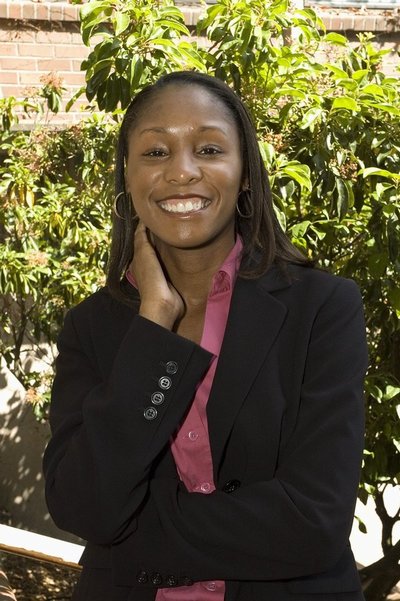July 6, 2006
New recruiter seeks underrepresented groups for science, technology, engineering, math
When Sibrina Collins entered graduate school in chemistry at The Ohio State University, it suddenly became obvious to her that minority groups were far outnumbered in graduate study of the sciences. “I think there were seven of us, out of 200 students,” she said. “The chair of the department at the time took us out to lunch and said, ‘Tell us what we need to do to keep you here. We have a lot of minority students that come through but they don’t finish.’ I asked myself right then what I could do to improve the numbers.”
Now it’s her job to do just that. Collins recently started a newly-created position at the UW Graduate School as director of graduate diversity recruiting, where her responsibility will be to help convince minority students to enroll in and complete graduate programs in science, technology, engineering and mathematics. In addition to the Graduate School, the position is supported by the Provost’s Office, the Office of Minority Affairs, the College of Arts and Sciences and seven National Science Foundation-funded interdisciplinary centers at the University.
According to Collins, her recruiting job won’t be easy and it won’t happen overnight. “A lot of it is geography,” she said. “The UW is an easy sell. It’s an excellent institution. It’s the city of Seattle that you have to sell.”
Most African Americans in particular, she said, are from the southern states, and it’s a little hard for them to contemplate moving so far away from their families. “The minority population here is small, and people coming here have to be assured they can be comfortable in their surroundings; they want to see other individuals like themselves.”
Bob Crutchfield, acting associate dean for the Graduate Opportunities and Minority Achievement Program in the Graduate School, said it was the difficulty of recruiting in the science, technology, engineering and mathematics fields that led the school to create the position. “Recruiting underrepresented minorities into graduate school is a challenge,” he said, “but these fields are a particularly difficult nut to crack and require special efforts.”
He credited his predecessor, Johnnella Butler, and Alvin Kwiram vice provost for research emeritus, for coming up with the idea for the position. “I thought they were overly optimistic with the job description they created,” Crutchfield said. “But then we found Sibrina.”
Of course, Collins won’t be doing all the recruiting personally. Ultimate success, she said, depends upon partnerships — particularly partnerships between the UW and schools that serve large minority populations. The school where she taught prior to coming to the UW, for example, is a small, historically black college. Collins is suggesting to UW departments the names of professors from that school who might be invited to come and give a seminar here. Contacts like that can be built upon, she said.
“One thing that can be very valuable for us is our summer research programs for undergraduates,” she continued. “Get the students up here in the summer when it’s beautiful and they can do the research and see all the wonderful resources here. Then the light bulb will go on and they’ll say maybe I can come here for four to six years.”
It was just such a program that lured Collins herself into graduate school. She was not a strong student in her Detroit high school, she said, and started her higher education career in community college. A class she liked convinced her to major in chemistry, and when she transferred to Wayne State University, she participated in a National Institutes of Health-funded program called Minority Access to Research Careers. That was her first taste of research, which led her to seek advanced education.
Because Wayne State is in Detroit, Collins didn’t see an absence of minority students around her, but that all changed when she got to Ohio State and made her great realization. From there she went on to a post-doc and then to a teaching position at Claflin University in South Carolina.
But the idea of getting more people like herself into graduate programs remained in her mind, and she tried to talk to Claflin students about graduate school whenever she got the chance. Then her post-doc adviser — a UW graduate — told her about the job here, and she was immediately attracted.
“When I read the job description, I felt like I was reading about myself,” Collins recalled. “I said, ‘I have to apply.’ I felt it was tailor made for me.”
Crutchfield agreed, ticking off her qualifications: “She has a Ph.D. in chemistry, she did her post-doc with Isaiah Warner, one of the foremost African American scientists in the country, she’s been a faculty member, she’s worked at a historically black college and she’s done recruiting as a volunteer. In other words, she has the background that will allow her to relate to the potential students and to faculty.”
Since she arrived in May, Collins has been busy meeting people, sending out brochures and trying to make connections.
“What I’m looking to see,” she said, “is an increase in enrollment of underrepresented groups by fall quarter, 2007. Of course, that’s just the beginning. You aren’t going to see results in graduates until four to six years out.”



